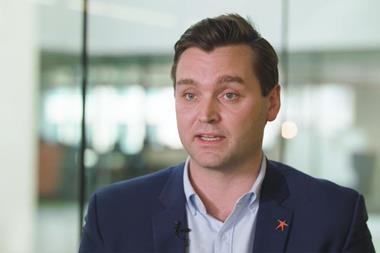In association with

In this video, HSJ Information’s content director Oli Hudson speaks to Leora Horn, senior vice president of late development oncology at AstraZeneca, and Bristi Basu, honorary consultant medical oncologist at Addenbrooke’s Hospital, about what role research and clinical trials can play in eliminating cancer as a cause of death.
Oli Hudson
Hello, I’m Oli Hudson, content director at HSJ Information. Welcome to the latest episode of the Cancer Project Zero video series in partnership with AstraZeneca.
One in two people in the UK will develop cancer during their lifetime, making it our greatest health challenge. Cancer: Project Zero explores the bold ambition to one day eliminate cancer as a cause of death. That’s a huge goal, but by asking the right questions and shining a light on the innovations shaping oncology, we can understand what it will take to get there.
In this episode, we’ll be focusing on the vital role that research and clinical trials can play. I’m delighted to be joined by Leora Horn, senior vice president of late development oncology at AstraZeneca, and Dr Bristi Basu, honorary consultant at Addenbrooke’s.
So, thank you very much for joining us today. Bristi, can I turn to you first? We’re going to talk about Project Zero and cancer, where the aim is to have zero deaths from cancer, which is a very ambitious aim. So, what makes you think that aim can be reached?
Bristi Basu
Yeah, thank you. I think, obviously, it is a very ambitious aim to have zero deaths from cancer. But I think it’s easy to be nihilistic about the question and think that, okay, cancer biology is so complicated, resistance pathways are inevitable, you know, we won’t get anywhere. But actually, I think there is so much to be hopeful for. Even in my line, which is in therapeutics, we know that, as I was in training, cancers which really had a very poor prognosis, were quite rapidly fatal, things like lung cancer, melanoma, there’s been a sea change as a result of things like immunotherapies, which have really transformed their survival rates. So, we actually, effectively, have some patients who are cured.
And so, I really think that, you know, with the advent of more precision approaches to cancer treatment, I also think that, you know, understanding the patient’s biology, we can drive more rational therapeutic approaches and so improve their treatment. So, they’re actually living with cancer rather than dying of it. And in addition to that, even before the therapeutics angle, I think we’re getting better at earlier diagnosis and patient awareness. The earlier we can diagnose patients, the more chance we can give them effective treatments, and the more chance we have of curing them.
And even before that, we can look at the prevention space and actually look at populations who are at risk and maybe try and target interventions appropriately in that population.
Oli Hudson
Okay. So, Leora, can I come to you as well? An exciting time to be working in oncology, then. Do you believe in the possibility of zero deaths from cancer too?
Leora Horn
Absolutely. You know, it’s all about getting the right therapy to the right patient at the right time, and with better diagnostics and better therapeutics, and really understanding the patient journey. So that even though we are at progress today, there are still too many patients who are dying from disease.
Oli Hudson
So, let’s talk about research. Can you walk me through what’s happening with research and how that is impacting your projects?
Bristi Basu
Yeah. Well, I mean, obviously, research is critical for driving any progress. We need to have the throughput from the discovery science and understanding what is happening in cancers in general, but in a patient-specific manner as well, so we can target those sensitivities appropriately. But also understand, as Leora said, what is likely to be a resistance mechanism. So, we can then plan the next iteration of treatment.
So, I think that obviously clinical trials, clinical research, is really critical for driving the interventions from that bench to the bedside. And also, then taking back some of the information that we learn from patients as they go on to trials and learning more about what processes are happening to stop treatment from working.
So, I think research is critical. It gives people a chance for us to collect very evidence-based data to support use in specific patient groups, and also it gives access for patients to treatments nice and early. And I think that participating in research also, we know that if you have health research within health systems, there is quite a strong association with better patient care, better outcomes in terms of survival, and also, actually better retention of staff. So, these are all positive things.
Oli Hudson
So, just sticking with access and research for a second. Do you think that there’s future in moving trials into primary and community care settings, getting more people involved that way?
Bristi Basu
Absolutely, absolutely. I think it’s critical, in fact. So, you know, traditionally, a lot of the research has been siloed in academic institutions, and so, it might be very difficult to access if you’re in communities which are rural, the underserved populations, certain demographics and ethnicities. And actually, bringing research closer to the patient means you’re more likely to participate. It’s just going to be easier to participate. And then there’s that inherent trust. You know, if you’re being treated within your community, you may be less wary than going far afield and not knowing the teams and wondering if you’re a guinea pig. All these sorts of things can play into people’s decision-making as to whether they want to go into trials. So, I do think that specifically in the early cancer and early detection kind of sphere, bringing the trials from the large academic centres into the community centres, into the GP practices, is going to be very, very useful and beneficial and desirable for patients as well.
Oli Hudson
So, Leora, can I ask what regulatory changes are needed to make better access possible?
Leora Horn
I don’t know that you need the regulatory changes. But I think, just building on what was said is, we know that when a patient is diagnosed with cancer, it’s not the patient that you’re treating, it’s the whole family. And when we’re asking a patient to come to academic centres for a clinical trial, for example, there’s multiple extra visits that you might not have incurred if you were getting standard of care.
I think the pandemic also propelled us into the world of telehealth, where a lot of sites were not really using telemedicine. They weren’t thinking about remote patient monitoring. And I think what we’ve seen over the last five years is this increased access in the community to, you know, maybe you have to come to your cancer centre for your infusion, but you can get your local labs at home. And you can get a telehealth visit, maybe in between, just to check in on toxicities, or more patient apps where they can access. So, I think a big part as well is when you bring those drugs into the community, community doctors are aware of the toxicities of those therapies. And they can help the academic sites manage those patients and keep them safe on therapies. And if they’re managing the toxicities, the patients will continue on therapy. If you have a bad experience, the patient will be like: I’m done. I don’t want this anymore. And so, I think there’s so many opportunities for us to partner together to make this more accessible.
Oli Hudson
So, we’ve talked quite a lot about access. Can we talk now about diagnostics and the new wave of cutting-edge diagnostics that’s coming into the oncology space? So, we have AI-powered imaging, ctDNA and liquid biopsies. Can you walk me through this and how this is making a difference?
Bristi Basu
Well, I mean, it’s, it’s still probably early days for a lot of this technology, but clearly, it’s a direction of travel which is quite desirable, I would say, for patients, and also for the infrastructural needs, our resource restraints. Because, you know, diagnostic scanning, it takes time and effort and resource, which is very precious in terms of the specialist knowledge to interpret scans. So, wherever we can use AI to aid or speed up some of these, it helps with the workforce issues, and also it might mean that there’s less discrepancy between sites, and so it evens the playing field. So, I think from a point of view of AI-based imaging, then it certainly has some beneficial aspects in terms of the diagnostic process and potentially helping some of the workforce, resource implications.
In terms of ctDNA, I think that’s a really – circulating tumour DNA, so shed from the tumour – I think it’s a really interesting kind of additional biomarker, and what does it mean? Well, I think in terms of changes in the circulating tumour DNA, either in the quantity or in the quality of it, and what mutations arise and you can track, I think that’s very fascinating, because you can actually then consider de-escalating, or escalating your strategies if you’re finding the presence or the absence of the DNA, ctDNA, or even just changing or switching your therapeutic strategy if you’re finding the emergence of new resistance patterns and mutations. So, it’s actually very interesting. And as a potential surrogate, I think the question is, how good it is as a surrogate for longer-term outcomes like survival. And I think no minimal residual disease, if you are finding circulating tumour DNA at high quantities, you know, does that mean that you’re going to relapse faster and have poorer survival? Well, that’s actually quite a powerful mechanism, then, to say: Well, in that case, I’m going to drive my strategy for escalation of your adjuvant treatments, you know. So, I think that it definitely has a role to play. But whether at the moment it’s being adopted, to actually approve treatments and their interventions, I think there’s still a little bit of convincing and validation work being done.
Leora Horn
Yeah, I think there are a lot of possibilities. And I agree. I think right now, with ctDNA, you know, in haematology and liquid tumours, they’ve been using it for a long time, because the assays are sensitive enough. In solid tumours, they’re getting better. But there’s sort of the two parts. There’s the personalised assays, which require the tissue and the blood to be able to develop that liquid biopsy, where you can follow patients. And then there’s the tumour agnostic, where you just have the blood. But those ones, I don’t think, are quite ready yet for widespread use. We’re using them in some of our trials. We’re collecting it a lot to both understand the patients who maybe are at higher risk for relapse, to make quicker decisions on phase one studies of “this drug is working, or this drug is not working”. So, I think there’s some small use cases that we’re using it now.
I agree it’s not ready. The regulators aren’t using it yet for regulatory approval, but maybe there’s a world a few years from now, because we know patients will relapse in blood before you see anything on imaging. The question is, what’s that length of time? Is it weeks, or is it months or years? And so, once those assays get better, there’s a potential that regulators will allow that house to use it for approvals and giving patients access to therapy sooner.
I think we’re just at the cusp of AI. There are so many different use cases for AI in imaging to understand not only our therapies, if they’re working, but also understand the toxicities for our therapies. You know, imagine a world where we’re using AI not just with imaging and blood, but to scan the entire patient chart in the primary care office to help that primary care physician say: Based on how these trends in this patient’s labs have changed, you should be screening them for X disease. It could be cancer, could be diabetes, it could be heart disease, and that gets us that one step closer to prevention.
Oli Hudson
So that brings us to real-world evidence, really. So, is that helping us understand the ongoing impact of these treatments? Is AI going to affect that?
Leora Horn
Yeah, you know, I, I think it’s amazing what’s happening with real-world evidence, because right now, trials are such a small patient population, and often the demographics of the patients are meant to represent the patients that are out there that’ll get the therapies. But we often miss out on demographics because of access to care and community sites or countries where the studies are.
I think there’s a future world where, right now, you have access to the data in the UK. And there are some countries where, you know, in the US, there’s the Flatiron data sets that you know, people can purchase. And we use that sometimes to look at what are the patient outcomes? I think there’s a future world where the data sets come together. And with electronic health records, I think that that is the potential. Right now, it’s still a little bit fragmented. So maybe you can understand the patient journey in one part of the world, but you can’t fully understand it. And these diseases are impacting patients everywhere. And so, I think in the future, with electronic records and investigators bringing all of that data together, so that we see what the impact is on care, and are we really making those improved outcomes? Because right now, to me, it’s a little bit fragmented and we’re not quite certain of what that bigger impact is and how close we are to day zero.
Bristi Basu
Yeah. And I think, you know, the NHS supposedly is cradle to grave. And so, you can imagine the whole health journey and pulling out all the comorbidities and trying to work out how it interacts with the condition of interest. And the data set would be so rich if we could harness that.
Oli Hudson
If we had all the data points of interest.
Bristi Basu
Exactly. It really could be. It’s very important that patients have trust in the system, that they’re consented appropriately, that they can use their secondary data to inform some of the strategies. But I think that in many cases, I think if they’re aware of what it offered, and actually, this means that because you’ve got three factors in here, we might actually offer you a chance of this trial.
So have these little waypoints which say, you might be suitable for this trial or this, which they wouldn’t necessarily know about otherwise. And no human, I mean, the AI in my brain does not remember all of the points of a clinical trial. Prompts are really helpful. Your systems have to help you help the patients. So, I think that utilising all of that data is going to be so rich. It’s going to be very time and resource intensive, but I think it’s going to be worth it.
Oli Hudson
Okay, so, Bristi, you’re working in the UK oncology space. What do you think we can learn from other countries internationally about how they’re tackling this?
Bristi Basu
Well, I think that the O’Shaughnessy report really brought up some critical findings, really, in terms of why we are potentially lagging behind international counterparts in terms of our clinical research activity. And I think that trial setup and all sorts of aspects to the trial setup – it’s clear that we need to streamline processes at all levels, not just at the MHRA, HRA, kind of, the regulatory and contracting levels, the ethics review levels, which I think, you know, there are definitely moves to be made there, but also in terms of the site level kind of issues, and how we speed up every aspect of those. I think that obviously having clinical research-focused time in people’s job plans is going to be very important. And that’s very difficult in a very pressed health system, where there are always competing interests in terms of service, as opposed to research. And it’s trying to marry those two together.
I think post-Brexit, there certainly have been some challenges. And we really need, as a country, to make sure that we are aligned where it can make us escalate or expedite our processes, and also look for where divergences can actually be in our favour. Ideally, that would be in more flexible, adaptable processes at all levels. I think that we want to use it as an opportunity, rather than holding us back and making us less desirable as a global site.
Oli Hudson
And same question to you, Leora, what you make of the UK as an environment, looking inwards and comparing it to other countries, and how they deal with this?
Leora Horn
So, you know, I think it’s a global problem in terms of right now, research is often looked at as an additional burden to the sites. And I think there is an opportunity to make clinical trials the standard of care. So that, you know, what you offer your patient is a clinical trial, if that trial is available, and if it’s not, then you give them what’s available, but to put it into that workflow, that it’s part of standard of care. That’s the first thing that you should be thinking about with your patients. Recognising there’s complexities in doing that, I think again, there’s opportunities with AI and healthcare records that there can be that prompt in the chart of “your patient is eligible for this”.
So how do we take the burden of providers trying to screen through 30 or 40 clinical trials that they may have open at their centres to figure out: “which one is my patient eligible for?” Can we use AI and technology to be able to flag that for the provider, to make it easier?
And then the second part, and again, I don’t think it’s unique to the UK, is patient education. Because without the patients, we don’t have the clinical trials.
And so, what can we do to inform the patients of the benefits of participating in a clinical trial, rather than making them feel like it’s something scary or something experimental? But it really is that opportunity to get something better. And so, I think, as we work on that together–
And then the final part is the patient advocates. Because, you know, you look at breast cancer, where the outcomes have improved dramatically, globally, there are a lot of patients alive who are telling their stories. And the more patients that we can get out there who can share their stories and who they are and what has happened to them during their care – many of them have participated in clinical trials – the more opportunities we have to enrol more patients – in the UK, but everywhere on those studies.
Bristi Basu
And I think there are some very strong patient advocacy groups in the UK, very invested in trying to improve research opportunities and access, and actually getting them involved in some of the co-design, co-development, the strategies for participation and delivery. I think it’s really critical to actually involve those voices early, really early, and say: is this going to be feasible? Because you know if a trial is going to be popular, and how to help it succeed. So, I think it’s really important to involve that early.
Leora Horn
And we do that with many of our studies. We have patient advocate groups. We also have nurse navigators and research associates who weigh in, not just on the design of the studies, because that’s what we’re talking to the academics about, but also the practicalities of the different schedules and how often the patients have to come in. Is this something a reality? Is this going to be doable as we roll this trial out?
Oli Hudson
Well, Bristi, Leora, that’s all we’ve got time for. So, thank you very much for joining us today.
A big thank you to Dr Bristi Basu and Leora Horn for sharing their insights today. In this episode, we’ve explored how research and clinical trials are not only pushing the boundaries of science, but also reshaping access, equity and patient experience across the NHS. From decentralised models to real-world evidence, these innovations are vital steps on the path to Project Zero. Thank you for joining us for this latest episode. We hope today’s discussion has inspired you to consider the role we can all play in building a future where zero people die from cancer.
The views expressed are those of the individuals and not those of AstraZeneca or any other organisation
To find out more about AstraZeneca’s Cancer: Project Zero campaign, click here.
GB-71526 November 2025
Topics
WATCH: Is precision medicine the future of modern cancer care?

Welcome to the first video in our series, created in collaboration with AstraZeneca for Cancer: Project Zero.
- 1
- 2
- 3
- 4
 Currently
reading
Currently
reading
WATCH: How clinical trials and research can reshape cancer patient experience









































